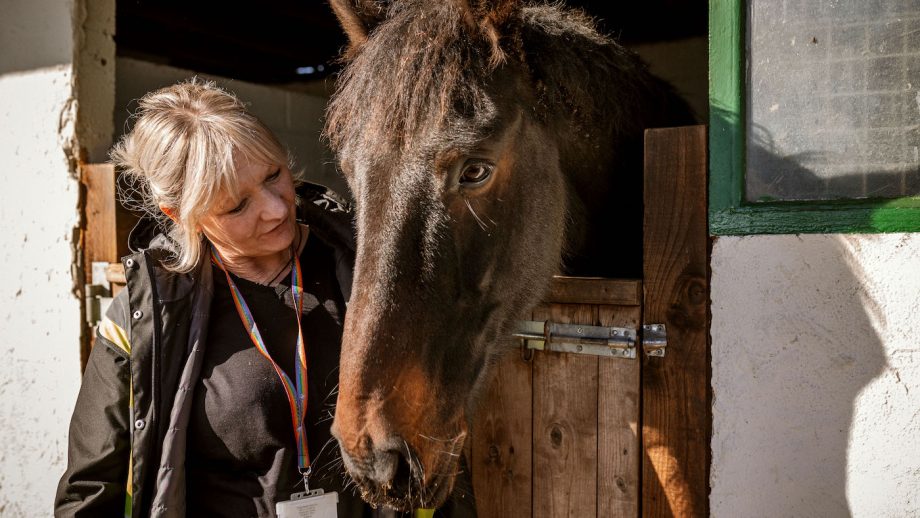The benefits of hippotherapy for patients recovering from breast cancer have been highlighted in new research.
French researchers of the Equiphoria Institute carried out a clinical trial and published the findings in medical journal Cancers. Led by Helena Viruega, the trial aimed to assess the relevance of hippotherapy in helping a patient during their recovery. Hippotherapy is a health professional-led physiotherapy treatment during which the patient is led on a walking horse, and is used to help with a number of disabilities, and conditions such as strokes, multiple sclerosis and dementia.
The researchers discussed the “personal tsunami” a person can go through following medical intervention and treatment for cancer – and said patients have to find a way to “fully recover their sense of self”. They said that hippotherapy can “tackle this challenge” by providing an “efficient, non-intrusive, and custom-made framework” for the patient’s physical, mental, emotional and spiritual needs.
The six-month trial was carried out with two study groups; a group of women receiving hippotherapy treatment combined with a supportive care programme, and a control group receiving only the supportive care programme. The hippotherapy programme consisted of daily sessions for the first week, then twice-daily sessions for three days every two months. However the supportive care treatment was adapted and fully personalised to suit each participant’s needs.
The patients were asked to complete a series of quality of life questionnaires, to evaluate their mental and physical status during the six-month programme, following which summary scores were assigned. This score incorporated emotional, cognitive and social functioning, and levels of symptoms including fatigue, nausea, and pain.
The researchers verified whether these scores were affected by the two treatments, and recorded a significant positive change in the scores over time for the hippotherapy group. No change was observed in the control group.
“We confirmed these results through ad hoc tests for the hippotherapy group, showing an increase of quality of life after the first week of treatment. This improvement was maintained after the end of the program, i.e., six months after the first week of treatment, but no statistical difference was observed between the second and third questionnaire,” said the researchers, who carried out further testing and analysis.
The researchers also looked at the effect hippotherapy had on cognitive ability, fatigue, anxiety and depression, in patients recovering from breast cancer. The groups completed further questionnaires which allowed scores to be calculated and analysed. Those in the hippotherapy group showed more improvements in these areas over the six-month period than those in the control group.
“The hippotherapy group showed a much faster, favourable and continuous improvement until the end of the program, for each function assessed,” said the researchers.
“The most striking improvements were observed in global quality of life, and fatigue, while breast cancer-specific quality of life, cognitive performance, anxiety and depression and body image showed a less marked but still statistically significant difference at the final post-treatment evaluation.”
The researchers said previous research suggests exercise is important for improving the quality of life of patients but noted that this is challenging for those struggling with pain and fatigue.
“Hippotherapy initiates a physiologic passive movement that rapidly becomes self-induced. This movement is strongly imprinted in the patient’s body as their own locomotion and rhythm. Within this movement framework, the patient doesn’t feel that he is putting himself in danger and has the space to receive rewards (experiencing pleasure, relaxation, and feeling ready to let go),” they said.
The researchers concluded that the work demonstrated the relevance of hippotherapy as a “key initial stage” following cancer diagnosis and treatment, to aid recovery.
“Hippotherapy appears as the backbone and initial compulsory step of the supportive care strategy after diagnosis and primary treatment of breast cancer, preparing the patients for their self-empowerment and optimal reconstruction, and relying on the different options available to them,” they said.
Read the full study: https://www.mdpi.com/2072-6694/15/4/1317
You might also be interested in:

The healing power of horses to help more people than ever

Equestrian who survived cancer ‘grateful’ for illness as it has transformed her life — and others’

Subscribe to Horse & Hound magazine today – and enjoy unlimited website access all year round
Horse & Hound magazine, out every Thursday, is packed with all the latest news and reports, as well as interviews, specials, nostalgia, vet and training advice. Find how you can enjoy the magazine delivered to your door every week, plus options to upgrade your subscription to access our online service that brings you breaking news and reports as well as other benefits.




